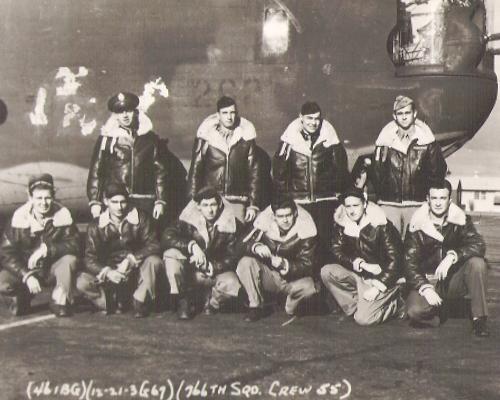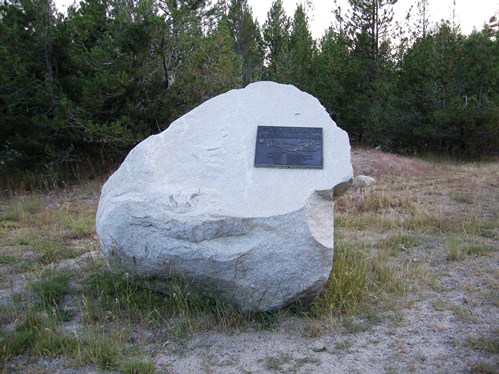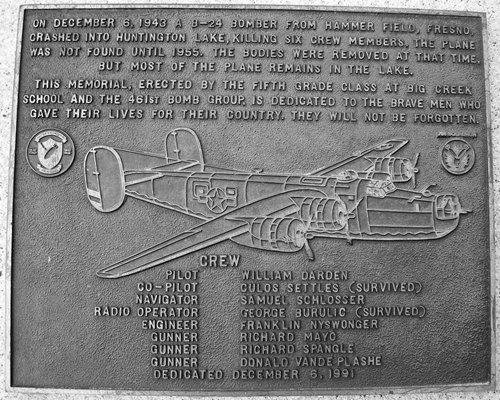Settle - #55
Standing L-R: Fish, Joel (N); Ostrander, Earl F. (B); Behrens, Richard (CP); Settle, Culos M. (P)
Kneeling L-R: Williams, William H.; Mayer, Earl L.; Charrette, Ernest F. ; Alexander, Robert D.; Piesens, Oscar A.; Barulic, George J.
B-24H Liberator, Serial No. 42-7674 flown by William H.Darden with co-pilot Culos M. Settle was on a search mission over the Sierra Nevada Mountains on 6 December, 1943. They were looking for the aircraft flown by the Turvey/Hester crew #(25) that was lost the previous day.
Courtesy of Peter Stekel
Darden/Settle plaque at Huntington Lake, California
Courtesy of Peter Stekel
Darden/Settle plaque at Huntington Lake, California
The pilot executed a peel off turn in order to separate from the formation at the stated inteval of fifty (50) seconds between planes. At this point the airplane was approximately N.E. of Huntington Lake at approximately nine thoousand feet (9,000) altitude. The terrain is rough with elevations of seven thousand (7,000) to ten thousand (10,000) feet in the immediate vicinity. The pilot sensed some difficulty which is not clearly defined by the testimony of the co-pilot and ordered the crew to jump. Two survivors left the plane and parachuted to safety. Parts of the plane were found in Huntington Lake. It is assumed that tha airplane and all others on board were lost in the lake.
A strong wind from the northeast is believed to have caused a downdraft which confused the pilot momentarily. It is belived that the low altitude with reference to surrounding terrain and the pilot's lack of familiarity with the terrain caused him to commit himself to a landing in the lake as an emergency procedure. There is no definite evidence to show mechanical difficulties resulting in a lack of power.
It is the opinion of the Board that the accident is attributable to personal error.
On board the aircraft were William H. Darden (P), Culos M. Settle (CP), Samuel J. Schlosser (N), Franklin Nyswonder (E), Richard E. Mayo (AE), George J. Berulic (RO), Richard I. Spangle (TG), and Donald Vande Plasch (G). The only two survivors were the co-pilot, Culos M. Settle, and the radio operator, George J. Berulic.
In spite of the fact that the co-pilot parachuted to safety no cause for the accident has been determined. He states that he can remember no cause for the performance of the airplane.
The airplane disappeared from view of the men who bailed out and apparently crashed in Huntington Lake, sinking immediately. Six men remained on board. The plane has not definitely been located, but floating debris leads to the conclusion that it is in the lake at a point where the water is one hundred and fifty feet deep. No bodies have been recovered.
Statement made by Co-Pilot, Lt. Settle
I was on a search mission and believe there were nine or ten planes in the flight element. We were in the 3rd element. We were to peel off at 50 second intevals. That would make us next to the last plane to peel off.We peeled off and one prop governor went out. It was the No. 2 prop. I pulled back on it and told him it sounded all right. The Captain said, "All right, hell, get out of here." We were losing altitude. He told the engineer to change fuses and then changed his mind and didn't say what fuses. He repeated orders telling crew to bail out. The Captain was repeating to bail out all the time when I got out. The bomb bay doors would not open. The engineer was busy putting on his chute. It was dark. I could not open the bomb bay doors. I could not locate the control to get the bomb bay doors open so I stepped back on the catwalk. The engineer opened the doors and I bailed out. Just before the doors were opened, the landing gear warning horn sounded. It went off so throttles must have been closed. I could see some of the instruments. The engines were putting out 25 inches on all four engines. The horns quit blowing after they blew once and that's all I remember.
I did see the tachometer. Looked out at props. Checked it and Captain Darden told me to reduce power and to pull back just a little and it sounded all right.
Question: Before you left the co-pilot's seat, were all four engines functioning?
Lt. Settle: They were running but losing altitude.
Question: Did Captain Darden make an effort to keep from losing altitude?
Lt. Settle: It was a matter of seconds. We didn't know altitude of the airplane. Nor do I recall the altitude or the air speed.
We were going down at that instant. Prior to that time we were fixing to climb over the mountains ahead around 11,000 feet. Fixing to fly 20,000 R.P.M., 32 in. hg. Would have been enough power to climb if something hadn't gone wrong. Naturally didn't know what was happeningbecause we should have been climbing.
When I bailed out we had changed the direction from south back to west. We were down between the mountain peakswhen I bailed out. The radio operator bailed out after me. He landed 1 1/2 miles from the lake side.
Question: Did you try to spot the plane?
Lt. Settle: No Sir.
Question: Was any other warning given other than verbal orders to bail out?
Lt. Settle: Sir, he was pushing the button but I didn't hear the bell in the nose and tail turret. I did see him pushing on the alarm bells and saying to bail out when I left. He stayed on the interphone.
Question: Did the plane seem to be flying normal?
Lt. Settle: Slower than other type E's. Ran as good as others just as fast.
Question: Did you change the throttles when you peeled off?
Lt. Settle: No Sir. I pulled back the prop on No. 2. The only reason ...... I had ridden with him before and had his instructions to reduce R.P.M. before reducing throttle.
Question: Was any steep turn made?
Lt. Settle: I imagine he did turn. I was in the bomb bay at that time. Didn't feel any hard pull. No Sir, no sensations. Made good turn down to valley. Headed directly down.
Question: How high?
Lt. Settle: Somewhere between 3 and 5 hundred feet.
Question: Did you notice any unusual atmospheric changes?
Lt. Settle: No Sir, only a cloud. If we hadn't turned we would have hit the clooud. I believe we turned about 2 miles before reaching the cloud.
We were probably 1,000 feet above the valley floors and barely above the peaks. The whole formation was to be at 10,000 feet.
There were two very high peaks in front of us and we had to turn to avoid them. I think we were above the peaks out losing altitude.
I am a first pilot but was acting co-pilot and in no position to take over as he was the commanding officer.
Question: You mention a cloud ahead of you. Was there very much cloudiness that morning?
Lt. Settle: Ahead, but not where we were.
Question: Could you tell anything about the wind?
Lt. Settle: Over the lake it was blowing west. Pretty strong and late that afternoon I went out over the lake in a boat and the waves almost turned it over. Pretty strong wind. It was from the east. Blowing east to the west. Two high peaks in front might create a down draft.
Question: Did you notice the airplane slowing up?
Lt. Settle: Just noticed the plane decend.
Question: How close to the cloud were you?
Lt. Settle: I would estimate at least 2 more miles would have carried us into the edge of it.
Question: Any electrical activity noticed (Atmospheric)?
Lt. Settle: No Sir.
Question: You say you recall hearing the landing gear warming horn?
Lt. Settle: Yes after trying to open the bomb bay doors. I looked back and saw the manifold pressure was back to 25 inches.
If he hit the flap handle it was after I left. He could have done everything possible while I was opening the bomb bay doors, like putting full power.
Question: What was the briefing?
Lt. Settle: Briefing was carried out. We were the 3rd element. The fellow in 729 was the lead ship.
Question: Method of search?
Lt. Settle: Flying in a straight line each one was to peel off after the first 50 seconds, covering a pretty wide area and still be rather far apart. The first plane started peeling off over Shaver Lake. 50 second intevals would give each one time to check and search his area.
Question: Were you warned about the mountains?
Lt. Settle: We were due to fly about 500 feet above the ground. Special direction definite heading from each point give you headings you should fly.
Question: Was any mention made of type of weather?
Lt. Settle: No Sir.
Question: No velocity of wind?
Lt. Settle: Don't know, may have been mentioned, I do not recall.
Question: Where were the other men riding?
Lt. Settle: Two in the tail and two in the nose. The men in the tail could have gotten out..... We could have been over the ridge, saw the trees and decided they would rather risk the lake than the trees.
Question: You didn't see them?
Lt. Settle: The door was closed. There was no scrambling around in the nose, no one trying to get out. That's the reason I thought they had jumped. It seemed that they hadn't. No evidence was found of any one else having jumped. Searchers found where we fell.
Question: Did the Captain get on the interphone?
Lt. Settle: I was on command set. Pilot had a ground connection and was on the interphone. Everything he said to me went on the interphone. The radio operator never coould find the trouble. He stayed on the interphone so he wouldn't block out communications. He decided to stay on the interphone. He couldn't say a thing but what was heard on the interphone.
Question: Do you recall the engine sounds?
Lt. Settle: Really didn't have sound of having full power. Even in the bomb bay you could feel that.
Statement made by Radio Operator, Sgt. Barulic
Question: Sergeant, what was the first notice of anything wrong?
Sgt. Barulic: Never noticed anything before he said to bail out. The Captain. I could hear him yelling. The first time I heard him say bail out, I took off my head set and started getting ready.
Question: Did he get on interphone?
Sgt. Barulic: Must have gotten on interphone.
Question: After hearing the Captain give the command to bail out, what did you do?
Sgt. Barulic: Started getting my seat chute on. It take some time to get it on. I got all ready to bail out. Went second.
Question: Where was the co-pilot?
Sgt. Barulic: Trying to open bomb bay doors standing almost against the bomb racks. There was room for three.
Yes, I could hear the warning horn blowingas I was getting my chute on. Looked and noticed the Captain was calling to bail out so I followed the Lieutenant out.
Question: Do you recall engine sounds?
Sgt. Barulic: At that time they seemed kind of quiet, losing altitude. Sort of felt that.



